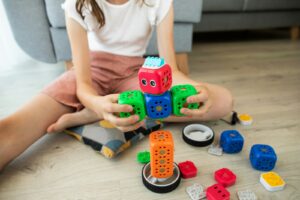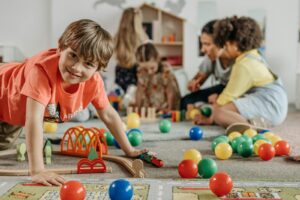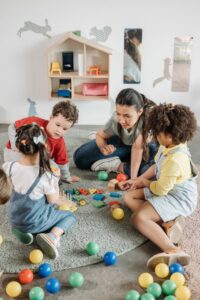Welcome! This article will delve into the world of educational toys and how they can enhance children’s learning through play. From building blocks to puzzles, toys can stimulate creativity, problem-solving skills, and critical thinking in young minds. Join us as we explore the endless possibilities of educational toys and how they can make learning a fun and engaging experience for children of all ages. Let’s pretend to learn together! Have you ever wondered how a child can be educated? Join us as we explore the world of educational toys and how they can benefit children’s development in a fun and engaging way.
What are Educational Toys?
Educational toys are specially designed tools and playthings intended to enhance learning, stimulate curiosity, and promote development in children. They come in various forms, from puzzles and building blocks to interactive games and musical instruments.
Let’s explore the world of educational toys and discover how they can positively impact a child’s development.
The Benefits of Educational Toys
Educational toys offer a wide array of benefits for children of all ages. They are designed to be both entering and educational, making them a valuable addition ild’schild’sme.
When children engage with educational toys, they are not only having fun but also actively learning and developing key skills. From improving cognitive abilities to enhancing social and emotional skills, educational toys play a crucial role in shaping a child’s sense of self.
Cognitive Development
One of the primary benefits of educational toys is their ability to enhance cognitive development in children. These toys are specifically designed to stimulate the brain, encouraging children to think critically, solve problems, and make connections between different concepts.
From simple shape sorters to complex puzzles, educational toys help children develop essential cognitive skills such as memory retention, logical reasoning, and spatial awareness. Children are challenged to think creatively and expand their problem-solving skills by engaging with these toys.
Fine Motor Skills
Educational toys also play a crucial role in improving fine motor skills in children. Activities such as building with blocks, coloring, and playing with construction sets require precise hand-eye coordination and dexterity.
By engaging with educational toys that focus on fine motor skills, children improve their hand strength, finger coordination, and overall dexterity. These toys help children develop the muscle control necessary for writing, drawing, and using utensils.
Social and Emotional Development
Educational toys contribute to children’s development in addition to cognitive and motor skills. Toys that promote collaboration, communication, and empathy help children build essential social skills and emotional intelligence.
From board games that encourage teamwork to role-play sets that foster imagination and empathy, educational toys provide opportunities for children to learn critical social skills in a fun and interactive way. Through play, children can practice sharing, taking turns, and resolving conflicts – all essential for healthy social interactions.
Language Development
Educational toys can also significantly impact children’s development. Toys that involve storytelling, reading, and interactive dialogue help children expand their vocabulary, improve their communication skills, and enhance their overall language abilities.
Educational toys that focus on language development can help children learn new words, practice sentence structure, and express their thoughts and feelings more effectively. These toys provide a valuable platform for children to explore the world of language playfully and engagingly.
Types of Educational Toys
Educational toys come in a wide variety of forms, each with its unique benefits and features. There is a diverse range of options, from STEM toys that focus on science, technology, engineering, and math to art and music toys that foster creativity and self-expression.
Let’s delete the most popular types of educational toys and explain how they can contribute to a child’s childhood.
Building Blocks and Construction Sets
Building blocks and construction sets are classic educational toys that help children develop spatial awareness, fine motor skills, and creativity. By building structures and exploring different shapes and patterns, children enhance their problem-solving abilities and unleash their imagination.
Puzzles and Brain Teasers
Puzzles and brain teasers are excellent toys for promoting critical thinking, logical reasoning, and memory retention in children. Whether a little jigsaw puzzle or a challenging brainteaser, these toys provide opportunities for children to engage their cognitive abilities and develop effective problem-solving strategies.
Musical Instruments and Art Supplies
Musical instruments and art supplies are perfect for fostering creativity, self-expression, and emotional intelligence in children. From painting and drawing to playing musical instruments, these toys offer children a creative outlet to explore their talents and emotions in a fun and engaging way.
STEM Toys
STEM toys focus on science, technology, engineering, and math, providing children with hands-on learning experiences that promote curiosity, innovation, and critical thinking. From coding robots to DIY science kits, STEM toys offer a dynamic approach to learning that encourages experimentation and exploration.
Role-Playing Sets
Role-playing sets allow children to engage in imaginative play, explore different roles, and develop social and emotional skills. Whether playing house, pretending to be a doctor, or creating a make-believe world, these toys encourage children to use their creativity and empathy to interact with others.
Choosing the Right Educational Toys
When selecting educational toys for children, it’s important to know their interests, abilities, and developmental needs. By choosing toys that align with a child’s preferences and learning styles, parents and caregivers can ensure that playtime is not only fun but also educational and beneficial.
Table: Tips for Choosing Educational Toys
| Consider the child’schild’sd developmental stage. | Choose toys that are appropriate for the child’s skill level. |
|---|---|
| Select toys that match the child. their | Look for toys that align with the child’s preferences. |
| Opt for toys that encourage open-ended play and creativity. | Choose toys that allow children to explore, experiment, and create. |
| Prioritize toys that promote learning and skill development. | Select toys focusing on cognitive, physical, social, or emotional growth. |
| Pay attention to safety features and materials. | Ensure that toys are safe, durable, and free from harmful chemicals. |
By following these guidelines and considering the child’s needs and preferences, parents and caregivers can make informed choices when selecting educational toys to enrich a child’s experience.
Conclusion
In conclusion, educational toys are a valuable tool for promoting children’s learning, development, and growth. By incorporating educational toys into playtime, children can engage in meaningful experiences that foster cognitive, motor, social, and emotional skills in a fun and interactive way.
From enhancing cognitive abilities to improving fine motor skills and promoting social and emotional development, educational toys offer a wide range of benefits for children of all ages. By providing children with access to engaging educational toys, parents and caregivers can support their children’s development and help them reach their full potential.
So, next time you plan playtime activities, consider the many benefits educational toys can offer. Join us in embracing the power of play and learning through educational toys—it’s an endless opportunity for growth, exploration, and fun!



